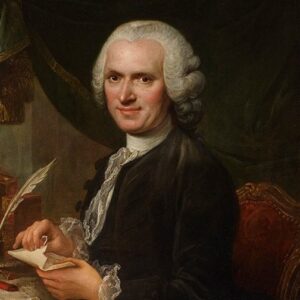Jean-Jacques Rousseau was born on June 28th, 1712, in Geneva, Switzerland. His mother died only nine days after his birth. Hence, his father, a watchmaker, raised him.
His father taught him about Ancient Greek and Roman literature and the majestic ancient republics. However, he had to leave Geneva, leaving young Jean-Jacques behind. At the age of sixteen, Jean-Jacques left Geneva too. He spent the following couple of years in Italy and France.
Rousseau turned from Calvinism to Catholicism. As a result, he lost citizenship in Geneva. Further, he tried out musical and teaching jobs. In 1742, Jean-Jacques Rousseau arrived to Paris. For some time, he served at the embassy of Venezia. Besides, he met the French philosopher and author Denis Diderot. Rousseau submitted essays to the Encyclopédie, which Diderot published. First, his articles focused on music. Later, he also started to write about politics and the economy.

✟ July 2, 1778, Ermenonville, France
Rousseau on politics
In short, his political belief focuses on the basis that people are born good but, society spoils them. He believed that we are born free. Only our later life binds us in chains. Hence, his political work call for freedom and nature.
In the 1762 work The Social Contract (note: not to be confused with the social contract as a theory), he defines a system so that it protects the equality of citizens. And, he thinks about how individual freedom and the authority of the state can co-exist. He further discusses the “general will” – the will of people as a whole. It differs from the intentions of individuals.
Rousseau believed that the general will is more important than the individual’s will.
People freely exchange their will in favor of society. In return, it provides them safety. So, the individual acts for the common good of people as a whole. Lastly, he despised the hereditary idea of monarchies. And hence, was in favor of a republic form of government. His ideas helped inspire the French revolution.
The author, philosopher, and musician was married to Thérèse Levasseur. They had five children, which they put into orphanages. He also published a world-famous book on education called Emile, or On Education. For his beliefs, Jean-Jacques Rousseau was followed by authorities, and his work was banned. He died on July 2nd, 1778, in Ermenonville, France.
“Man is born free and everywhere he is in chains.”
Jean-Jacques Rousseau

